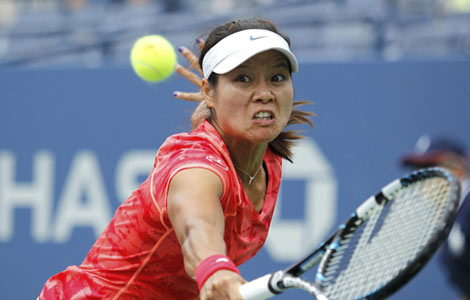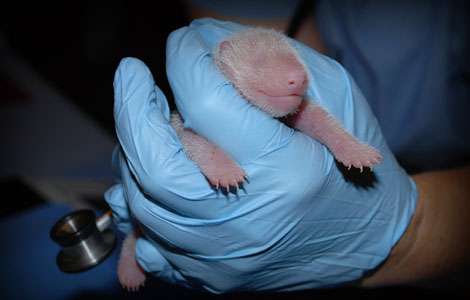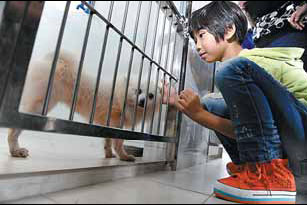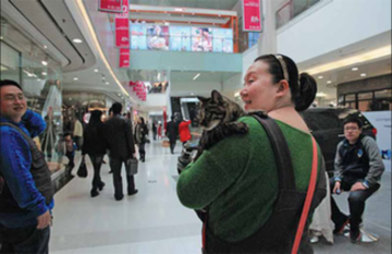Cry for pet protection laws
Updated: 2013-08-27 06:57
By Zhang Lei (China Daily)
|
||||||||
|
A girl caresses her canine friend at a shelter for stray dogs in Guangzhou, Guangdong province. The shelter is open for residents to adopt pets. Qian Wenpan / for China Daily |
Millions of cats and dogs slaughtered every year for food and fur trade, Zhang Lei reports
One by one, the joggers passed Dou Bao, a few giving her a quick glance. She is the queen of the campus sports field at the University of International Business and Economics in Beijing. She and the humans swap shifts to rule this territory. The humans control the days, she rules the nights.
Dou Bao, whose name means "Bean Bun", is a cute, brown tabby with a round head and almond-shaped eyes common to Chinese cats. Despite being abandoned, Dou Bao has been lucky. She has found a home on this school campus where the students who named her are welcoming and a number of compassionate souls feed her every day.
However, the harsh reality is that the number of this breed, officially known as the Chinese Li Hua, are dwindling in China every year, primarily because of unchecked interbreeding, but also because foreign breeds are becoming increasingly popular and domestic cats are being pushed aside. Those factors have put a dent in the species, according to Zhang Liyu, head of the Great Wall China Cat Club in Beijing.
The decline comes against a backdrop of a surge in pet numbers in China. There were around 100 million pet dogs and cats in the country at the end of 2012, six times more than a decade ago, according to Dog Fan magazine.
"This is one of the many side effects of the lack of a proper law pertaining to pets. Without that, there's no formal way to deal with the surge in the number of pets. Hundreds of cats and dogs are abandoned every day, especially Chinese breeds. A proper pet law is essential to raising awareness of the conditions in which they live. The matter is of great importance for the Chinese Li Hua, because it's the country's only internationally recognized national breed," said Zhang.
Raising awareness
After spending nine years promoting the breed, the efforts of Zhang and her team were finally rewarded when the Chinese Li Hua was officially accepted by the US Cat Fanciers' Association in February 2010 as an independent breed, not the result of hybridization. Now cats like Dou Bao are registered under the official English name and appear in the miscellaneous class at cat shows.
"This isn't a case of people insisting on pure bloodlines, we simply want Chinese breeds that retain distinct features to be recognized as members of the global cat family. They are as cute as any of the famous foreign breeds," said Zhang. "We hope that by doing so, we can raise public awareness of the living conditions of these Chinese breeds."
Jiang Hong, director of the Southwest China Branch of the China Small Animal Protection Association, said 99 percent of the victims of pet abuse and abandonment are Chinese breeds and the best way to stop uncontrolled breeding and abandonment is to enact specific laws to address the problem.
With the exception of the Law of the People's Republic of China on the Protection of Wildlife, which came into force in 1989, China has no specific laws dedicated to the protection of companion animals. Several existing laws have clauses relating to animal abuse, including the Rabies Management Regulation, under which the transportation of live animals requires transport licenses and disease immunity certificates.
Although this has put a limit on illegal pet animal trafficking to some extent, the past five years have seen an increase in the trafficking of dogs from the rural areas to Beijing. In the days when breeding was unregulated, Pekingese dogs sold for more than 10,000 yuan ($1,633) a decade ago, but now they barely fetch 100 yuan, according to an insider, who spoke on condition of anonymity. He estimated that there are at least 50,000 registered pet dogs in Beijing, but also around 30,000 strays.
In some regions where disease immunity certificates are easy to obtain, some of the trafficking trade caters directly to restaurants where the pets are slaughtered. The insider said 2 million cats and dogs are slaughtered every year for food and for the fur trade, but admitted that his estimate is most likely a conservative one.
In April 2011, volunteers rescued 500 dogs being transported on the Beijing-Harbin highway. The animals were cooped together in poorly made, filthy wire cages. Some had been injured as a result and were taken to pet hospitals. It's believed that the dogs were being taken to a slaughterhouse when they were freed and the truck owner had all the required transport certificates.
During the month that followed, 10 pet hospitals filed lawsuits against the China Small Animal Association, which provided aid in housing the rescued animals, demanding treatment costs of 50,000 yuan.
"This is a gray area, and despite the lax control of certificates in some regions, the fundamental problem is that under the current regulations, pets are treated as private property and there is no legal provision indicating their existence as living species," said Jiang.
To some observers, legislation to protect pets seems like a pipe dream, but in practice, animal rescue at the grass root level is attracting an increasing amount of public attention.
"In the larger cities, the number of animal assistance centers is on the rise and the number of people participating to help these stray animals is growing," Jiang said.
Funding sources
Chinese animal assistance centers have three sources of funding. First, they garner donations from international organizations such as the Animal Asia Foundation in Hong Kong and the International Fund for Animal Welfare in Beijing. The second source is money generated by public activities, while the fastest-growing source of funding is personal donations.
Jiang said most animal assistance centers won't accept new animals when they reach maximum capacity. Theoretically, when the number of animals reaches a certain level, some will be put down to make room for newcomers.
"However, without a special small animal law to establish these protocols, putting animals down is not an option at Chinese pet assistance centers. There are no ethical or scientific plans to carry out the practice, " Jiang said.
Many animal assistance centers have taken in too many strays, which has inevitably resulted in a decline in the standard of care. "There aren't enough staff at the centers to support worming treatment, feeding and the prevention of epidemics. Most crucially, there are not many veterinarians to perform sterilizations either," said Jiang.
Beijing Human and Animal Environmental Center was originally designed to hold 200 animals, but it currently has more than 300 inhabitants. Zhang Lyuping, the chief, said staff members take numerous calls every day from people who want to leave their unwanted pets at the center. The lack of a proper pet law has led to many people abandoning their pets without shouldering any legal liability.
As the assistance centers become more familiar with pet management, stray dogs and cats are treated in a manner tailored to their own natures. "We have realized that cats should not be caged in groups because they are basically solitary creatures. From what we have seen, they are likely to suffer from infectious diseases if they are caged together," Jiang said.
Wang Zipeng, an animal rescue volunteer said the government has simplified the procedures by which nongovernmental institutions can register and set up operations to collect money from the public, which will help provide new funds to support the protection and rescue of animals.
"I think at the current stage, if we want to accelerate the legislation process, too great an emphasis on the physical and psychological rights of animals won't draw much attention from the Chinese public. We have to make people realize that their well-being is closely connected with a healthy, functioning human society," he said.
A lack of consensus
Wang believes that legislation to prevent the torture of animals is much more urgently needed than an animal welfare law. In international terms, Chinese law lags behind countries such as the UK, which enacted laws preventing the abuse of animals in 1849.
An Xiang, an animal protection activist and public interest lawyer in Beijing, said, "The reason that this law has not yet been established is that there is no real national consensus on the matter. Many people are ambiguous about the issue."
Despite the dilemma, hope is not just coming from the grass roots level. As the animal welfare movement infiltrates every level of society and feelings grow stronger, with every act of animal abuse attracting criticism at the national level through both old and new media, the government has started to take a number of cautious steps.
The template for an animal protection and anti-abuse law was drafted in 2009 by Chang Jiwen, director of the social law research department at the Chinese Academy of Social Sciences. Although it has yet to be adopted, the draft prompted many delegates to discuss the issue at the National People's Congress.
In January 2011, the central government issued a ban on animal circuses and certain types of abuse, such as the use of violence to make animals perform tricks, at zoos. The Ministry of Agriculture has twice issued stringent rules on the quarantine procedures for dogs and cats.
According to the Chinese Veterinary Medical Association, the country will publish its first general rule on animal welfare later this year. Although not mandatory, most of the clauses will focus on the prevention of unnecessary suffering inflicted on small animals.
In May 2012, China's first regulation on dogs with a bearing on animal welfare at the county level was passed in Yangxian county, Shaanxi province.
"All these acts show that at the central governmental level, the process designed to formulate animal protection rules is speeding up. A consensus on animal welfare has been established among government leaders and this will prompt a greater number of demands for legislation relating to small animals," said Li Hua, president of Animal Guardians, a non-governmental animal rights group in Hong Kong. Li is convinced that a substantial number of government officials are in favor of introducing tough legislation.
"We believe reasonable and legal animal protection activities will accelerate the legislative progress. The relevant ministries and commissions have already taken steps. Although it may not look as though legislation is forthcoming, relevant research work has already been carried out," said Li.
Contact the writer at zhanglei@chinadaily.com.cn
|
A proud owner displays her Chinese Li Hua at a cat show in Beijing. Provided to China Daily |
|
Visitors choose animals to adopt at a cat festival held in Beijing's Chaoyang Park in 2012. Cheng Tingting / Xinhua |
(China Daily USA 08/27/2013 page7)

 Chinese navy starts escort mission at Gulf of Aden
Chinese navy starts escort mission at Gulf of Aden
 McGrady retires, considers career in China
McGrady retires, considers career in China
 Li Na breezes into US Open second round
Li Na breezes into US Open second round
 China and India set to resume military drills
China and India set to resume military drills
 Dwight Howard, Kai Ko promote fitness in Beijing
Dwight Howard, Kai Ko promote fitness in Beijing
 DC panda cub doing well
DC panda cub doing well
 Muslim Brotherhood leaders, Mubarak face trial
Muslim Brotherhood leaders, Mubarak face trial
 Cliff diving in the city
Cliff diving in the city
Most Viewed
Editor's Picks

|

|

|

|

|

|
Today's Top News
Nation must adjust when US tapers QE
Prosecutors seek heavy punishment for Bo Xilai
Pet abuse videos prompt outrage
China joins anti-tax fraud effort
UN to contact US over spying report
Foreigners nabbed for personal info trafficking
PLA Navy heads for routine drill in W.Pacific
Antitrust 'not target' foreign firms
US Weekly

|

|










